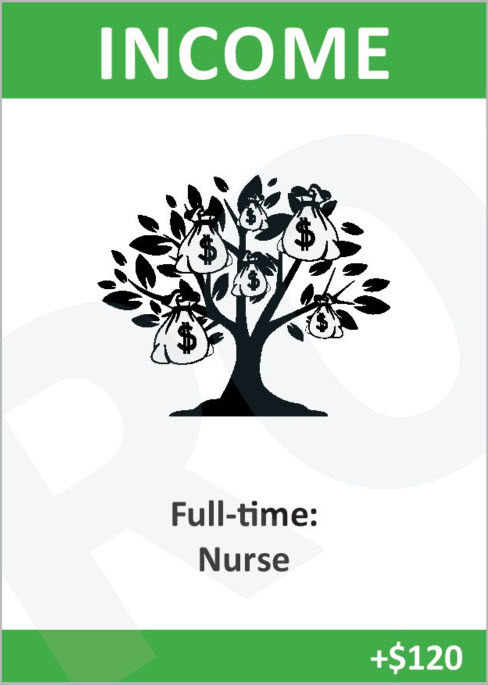
- The deck consists of Income cards, Windfall cards, Life Happens cards, and Financial Priority cards, which are prioritized by letter: (A) Giving, (B) Savings, (C) Essential Expenses, (D) Important Expenses, and (E) Additional Expenses. Shuffle all cards and deal five cards face down to each player. The remaining cards are placed face down as the draw pile and the top card is turned face up next to it to start the discard pile. The player to the left of the dealer goes first, and the play continues clockwise.
- Each turn consists of the following:
- Draw: Take two cards from the top of either the draw pile or the discard pile. The cards can be either from the same pile or one from each pile.
- Action phase: Take up to three “actions.” An action consists of (1) using a card from your hand to build your budget, (2) swapping a card in your budget for one in your hand, or (3) playing a Life Happens card to cause a roadblock for an opponent.
- End of turn: conclude the turn by either drawing or discarding to maintain a hand of five cards. Replenish from the draw pile only.
- Build your budget by placing the cards face up in front of you. You must begin with one or more Income cards followed by Financial Priority cards in the prioritized order, A through E. The prioritized letters are found in the bottom left corner of the Financial Priority cards. An (A) card must be in the budget before a (B) card can be played, a (B) card must be in the budget before a (C) card can be played, and so forth.
- You can only have one full-time job or business; however, you can have multiple part-time incomes with or without a full-time job or business. Also, your budget can have only one Financial Priority card for each priority category. An exception applies if playing additional cards in any priority category (without exceeding three actions in a turn) allows you to balance the budget and win the round in that turn.
- Financial Priority cards cannot be placed in your budget that exceed your current income, however, Life Happens cards, when played on you, must be added to your budget regardless of income. Also, if you lose a budget card (Income or Financial Priority) all other cards remain in your budget regardless of income or priority category.
- Swapping: You may swap a card from your hand with a card in your budget to exchange it for the same category of a different value. You can do this multiple times in a turn, with each swap counting as one action. An Income card must be swapped for an Income card, and a Financial Priority card (with priority A-E) must be swapped for a card with the same priority letter.
- Windfall cards: Windfalls are unexpected good fortune. These cards will help build your budget or counter a Life Happens card.
- Life Happens cards create obstacles for others. They only take effect when they are played and not when they are drawn. You may play multiple cards on different players in a turn, but only one per player. If you do not wish to play these cards on other players, you may discard them. Keep in mind that the next player may pick up the card and use it on you.
- The Windfall "Bounce Back” and "Just Say No" cards are used as a counter when someone plays a card against you. The Life Happens “Scam” card, on the other hand, can be played at any time, even during someone else’s turn. The three-action-per-turn limit does not apply to these cards. Just remember to replenish your hand to five cards when played.
- Achieve a balanced budget by allocating income to priorities A through E, ensuring every dollar of your income is accounted for in your budget and your expenses do not exceed your income. You must include all five priority categories in the budget. The round concludes when a player successfully builds their budget. After each round, players reshuffle and deal cards to play again. The first player to win two rounds wins the game.
To return to the main page, you may close this tab or window or click here.